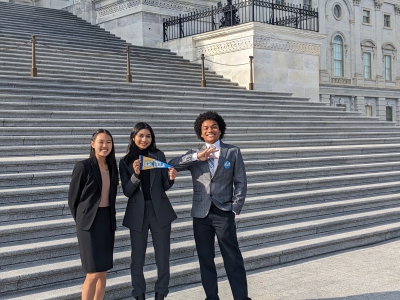UCLA Undergraduates Advocate for Humanities, Arts, and Social Science Research Opportunities
By Kayla McCormack
Undergraduate research opportunities can be transformative for students. But there are disparities in funding and mentorship across disciplines – more students complete research in the sciences than the humanities, arts, and social sciences. During the 2021-22 academic year 21% of total faculty-mentored undergraduate research enrollments at UCLA were in the humanities, arts, and social sciences.
UCLA students selected to the Scholars Transforming Through Research Program (STR) aimed to address this disparity. The STR program, run by the Council on Undergraduate Research and with training support through the Scholars Strategy Network, provides a platform for student scholars and faculty to advocate for the significance of undergraduate research opportunities. Three UCLA undergraduates – Madison Lee, Citlali Tejeda, and Taylor Gomez-Douglas – participated in the program, including an advocacy trip to Washington, D.C.
Students engaged with education aides from the offices of Senator Alex Padilla, Congressman Ted Lieu, and Congresswoman Nanette Barragán. Lee, Tejeda and Gomez-Douglas highlighted the importance of expanding research opportunities, particularly in the humanities, arts, and social sciences, drawing attention to UCLA’s unique Undergraduate Research Center for these disciplines.
“Meeting with Congresswoman Barragán’s office was such a memorable experience,” reflected Tejeda, a third-year Public Affairs student. “She is my Congresswoman. It was cool to see my district represented in Washington D.C. Our legislative visit was even more exciting because I was able to advocate for undergraduate research opportunities in the humanities, which is something I really believe in.”
Lee, a fourth-year Sociology major at UCLA, underscores the significance of undergraduate research in these fields. Through her own research on faculty willingness to mentor undergraduates, Lee discovered the transformative impact of scholarly inquiry. “Undergraduate research in the humanities, arts, and social sciences is shown to be very important,” she explains. “It allows students to develop high-impact skills, better preparing them for jobs. It can also help students develop a better sense of self and build confidence in their skills.”
The lack of financial support and resources for student researchers and potential faculty mentors in the humanities, arts, and social sciences can act as a barrier, hindering students’ ability to pursue independent projects and fully explore their scholarly interests. Research programs – such as those offered by UCLA’s Undergraduate Research Centers and Academic Advancement Program – provide scholarships and structure to empower students to conduct research and support faculty, but more can be done at UCLA and on a national level to provide funded programs across all fields and incentives for faculty mentorship and research-integrated course development.
Reflecting on her experience, Lee shares, “I never thought that I would be working on my own project, so it’s been very empowering for me. Before this I knew I liked research, but I didn’t think I could do it myself. Now I’m considering doing education research later in my life.”
Lee and Gomez-Douglass will also present their research at Undergraduate Research Week which takes place May 20-24
Learn more about opportunities to support Undergraduate Research at UCLA.



 David Esquivel
David Esquivel